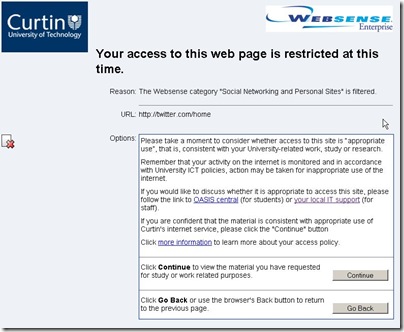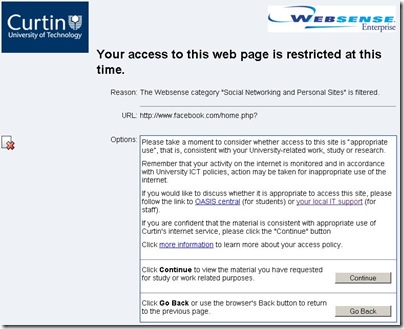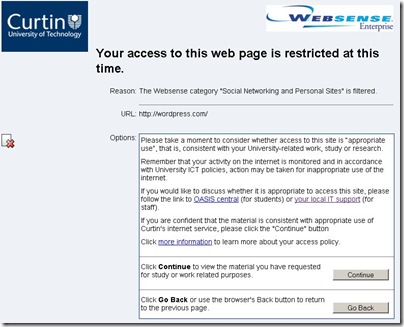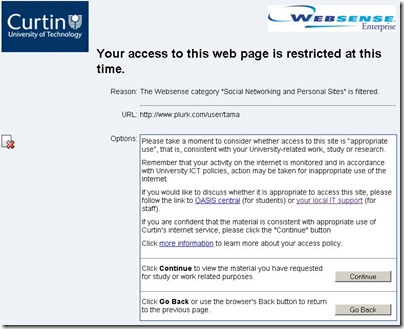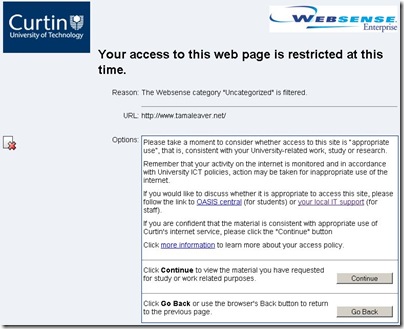Home » web2.0 (Page 13)
Category Archives: web2.0
We’re in a viral.
“Everything is fake.”
“Look’s good, though, doesn’t it!”
Annotated Digital Culture Links: April 3rd 2009
Links for March 31st 2009 through April 3rd 2009:
- Internet traffic in Sweden plummets on first day of law banning web piracy [Guardian] – Internet traffic in Sweden – previously a hotbed of illicit filesharing – has fallen dramatically in the first day of a new law banning online piracy. The country – home to the notorious Pirate Bay website, whose founders are awaiting a court judgment on whether they have broken the law by allowing people to find films, games and music for illicit downloads – has previously been seen as a haven for filesharing, in which people can get copyrighted content for free. As many as one in 10 Swedes is thought to use such peer-to-peer services. But the so-called IPRED law, which came into force on Wednesday, obliges internet service providers to turn over details about internet users who share such content to the owners of copyrighted material, if a court finds sufficient evidence that the user has broken the law. … internet traffic in Sweden had fallen by about 30% compared with the previous day.”
- New Wolverine film leaked online [BBC NEWS | Entertainment] – “An almost finished copy of X-Men Origins: Wolverine starring Hugh Jackman has been leaked online a month before its cinema release. The high quality copy of the film has been uploaded to several file sharing and streaming video websites. The movie is incomplete, with some special effects still in need of fine tuning and green screens and wires attached to actors still visible.” (It took less than 24 hours for this workprint to appear for sale in Jordan’s pirate DVD markets and C20th Fox are on the warpath. While a leak like this might be good for publicity, given that a workprint – which means unfinished special effects more than anything else – tends to emphasise the quality of the plot and dialogue, this could really hurt the box office.)
- Obama Depressed, Distant Since ‘Battlestar Galactica’ Series Finale [The Onion – America’s Finest News Source] – “According to sources in the White House, President Barack Obama has been uncharacteristically distant and withdrawn ever since last month’s two-hour series finale of Battlestar Galactica. “The president seems to be someplace else lately,” said one high-level official, speaking on condition of anonymity. “Yesterday we were all being briefed on the encroachment of Iranian drone planes into Iraq, when he just looked up from the table and blurted out, ‘What am I supposed to watch on Fridays at 10 p.m. now? Numb3rs?'” “I haven’t seen him this upset since Admiral Adama realized that Earth was actually an uninhabitable wasteland,” the official continued. “Or at least that’s what he told me. I don’t actually watch the show. It’s not really my thing.””
- Victim Of Wikipedia: Microsoft To Shut Down Encarta [ paidContent.org] – “Microsoft will discontinue both its MSN Encarta reference Web sites as well as its Encarta software, which have both been surpassed by rising competitors, like Wikipedia. In a message posted on the MSN Encarta Web site, Microsoft says, “Encarta has been a popular product around the world for many years. However, the category of traditional encyclopedias and reference material has changed. People today seek and consume information in considerably different ways than in years past.””
Curtin’s Internet Filtering and Blocking
How much does your educational institution filter the internet, especially if you’re at tertiary level (because K-12 filtering has other issues attached to it)? I ask because in my recent shift to Curtin, I’ve discovered the joys of university-level internet filter, something that didn’t happen at my previous institution. The list of blocked or click-thru site (ie not completely blocked, but having a warning message asking if you really need this website) seems to alter week to week. This morning, every time I want to visit Twitter, Plurk, Facebook or even a wordpress.com blog, I have to click through a warning page; every time I reload, I have to click through a warning page. Apart from being highly frustrating, I’m currently redesigning several units which are thematically linked by the concept of web presence; almost everything I want students to look at will have these warnings on the Curtin network. I wonder how many students will get frustrated and give up on the unit? This morning’s blocks so far …
Ironic Update: The first attempt to upload this blog post from my work computer led me to discover that even this website is blocked now:
I wonder what sort of hoops I’m going to have to jump through to try and fix this? 🙁
Update 2: Most of the blocking seems to have magically stopped as suddenly as it began about 12 hours ago so, being generous, I’d like to believe this was an accidental blocking … I’d really like to believe that …
Annotated Digital Culture Links: March 18th 2009
Links for March 13th 2009 through March 18th 2009:
- Fake Stephen Conroy lashes out at Telstra [SMH] – “Telstra’s attempts to cover up the fact that it tried to silence Fake Stephen Conroy have backfired spectacularly. The Telstra employee who created the satirical Twitter profile has told his bosses not to “throw me under the f—ing bus just to make Telstra look social-media savvy”. After it was revealed that the popular Twitter profile impersonating Communications Minister Stephen Conroy was written by senior Telstra employee Leslie Nassar, the postings stopped. Nassar refused to speak to media, saying he was told to direct all comment requests to Telstra’s public relations unit. The Fake Stephen Conroy profile was also disabled for a period before reopening late yesterday. Telstra’s social media adviser Mike Hickinbotham came out to declare that Telstra did not try to shut Nassar up nor tell him to cease making the Fake Stephen Conroy posts. This directly contradicted earlier comments by Nassar, who said he was told by Telstra to stop.”
- Telstra man behind Fake Stephen Conroy [SMH] – “A web prankster impersonating Communications Minister Stephen Conroy on Twitter has been outed as a Telstra staff member. The staffer has now been silenced by the telecommunications giant, perhaps out of fear that the revelations will further increase tensions between Telstra and the Government, which has excluded Telstra from the bidding process to build a $10 billion-plus national broadband network. The satirical “Fake Stephen Conroy” profile, which has now been wiped, sparked almost as much discussion online as Senator Conroy himself. It primarily lampoons the Government’s proposed mandatory internet filtering scheme. Following an online manhunt that turned up a long list of suspects, Fake Stephen Conroy decided to turn himself in before he could be outed.
“OK, so here it is; Fake Stephen Conroy = Leslie Nassar,” he wrote yesterday.” (‘Twas fun while he lasted! 🙂 - Journalism students ‘don’t read papers’ [ABC News (Australian Broadcasting Corporation)] – “The journalists of the future are rapidly moving away from traditional news services, saying they are impractical compared to new media. A survey of Australian journalism students found 90 per cent of students do not like reading the newspaper, preferring to source news from commercial television or online media. Professor in Journalism and Media Studies at the Queensland University of Technology, Alan Knight, conducted the survey and says despite an aversion to newspapers, 95 per cent of students are very interested in following the news. “At this stage commercial television is still the favoured source, but online is rising pretty rapidly,” he said.” (I read most of my newspapers online, too. That said, i really hope some of the journalism students of today and thinking of ways to ensure that quality journalism is economically viable in the future!)
- Gervais + Elmo = Hilarity on ‘Sesame Street’ [YouTube] – The funniest thing you’ll see today – Ricky Gervais and Elmo taking an interview to a place Sesame Street realyl shouldn’t go! And, as Waxy says, they have the same laugh!
The Future Newspaper … Isn’t?
Clay Shirky’s ‘Newspapers and Thinking the Unthinkable’ has been getting a fair amount of attention in the past few days and his central point is ringing true for most people: the traditional revenue model of the newspaper is so dead that it might just be time to admit that in many cases news will need to find (a) new platform(s) of choice. It is worth noting, though, that Shirky is not downplaying the important role journalists have to play in our society; what he has resoundingly challenged is whether collecting their daily output on printed paper has much of a future. Indeed, Shirky’s conclusion is worth noting:
Society doesn’t need newspapers. What we need is journalism. For a century, the imperatives to strengthen journalism and to strengthen newspapers have been so tightly wound as to be indistinguishable. That’s been a fine accident to have, but when that accident stops, as it is stopping before our eyes, we’re going to need lots of other ways to strengthen journalism instead.
When we shift our attention from ’save newspapers’ to ’save society’, the imperative changes from ‘preserve the current institutions’ to ‘do whatever works.’ And what works today isn’t the same as what used to work.
I concur; the world at large needs good journalism, but many good journalists will need to find a new home and it’s likely a new medium, too. On March 12, the New York Times posted this visualisation:
You’ll have to click and see the enlarged version to read the text, but the brown and beige circles show declining circulation numbers for US newspapers; blue circles show increases (there are very few blue dots). The US is a country of brown and beige dots. The fact that neither Shirky nor anyone else knows what should come next is an important tension. For those currently making a living working for newspapers who are laying off staff, this is a really immediate tension and, to be honest, I’m glad I’m not in those shoes. For society more broadly, the question of where we get our news, and whether we’re willing to pay anything for it – either personally or through an organisation we support, or even through government funding – is something we do need to consider. I have to say, I’m feeling more protective than ever of the Australian Broadcasting Corporation and SBS and have no qualms whatsoever about some fraction of my taxes supporting both. And sitting at a point of convergence of the best traditional journalism and web 2.0 platforms have to offer, I’m glad that people like Margaret Simons are finding new ways to keep the fourth estate alive and well. (And to be fair, there is still a lot of quality journalism out there … it just too often gets buried behind the bleeding leads.)
For Perth folks, the paucity of our current choice in newspapers has been obvious for a long time; we only have one and it has spent almost all credibility it ever had. A new editor is on board now, but it’ll take a lot before The West holds any serious sway or has most people read it for anything other than the TV Guide and Saturday classifieds. In a well timed move, Perth’s citizen journalism advocate, Brownen Clune, has just relaunched her own web presence, hitting the ground running a provocative post entitled ‘The Emperor’s New Media’ which argues that many journalists lack credibility, and the profession overall is in disrepute, leaving little wonder why so many folks don’t want to pay to read it anymore:
Can we be so quick to blame the business models of newspapers (selling advertisements) when people won’t miss the service (news) they are providing? For years journalists have been regarded alongside used-car salesmen as the least trustworthy profession and every journalist has certainly experienced the polite disdain from strangers when you tell them what you do.
There is something very wrong with the media and the quality of journalism has a lot to do with it. “News” has become so devalued that people are not willing to pay for it.
Bronwen’s post has attracted some spirited comments from Fairfax journo Nick Miller (continuing an older debate, really) who does remind us that Perth certainly hasn’t really developed much of an alternative model as yet (and Bronwen’s PerthNorg, which is valuable, relies a great deal on filtered content created by the mainstream newspapers). But to return to Shirky’s point, we need more experiments, like PerthNorg, which are willing to try and find new ways to connect journalists of various types with audiences.
In terms of the quality of journalism out there, there’s definitely appetite for more transparent reporting and for reporting that returns more clearly to the notion of the fourth estate; keeping the average citizen informed is, after all, the aim. If nothing else, the fact that Jon Stewart and The Daily Show (a comedy show!) managed to get so many tongues wagging in the US recently when they went after CNBC’s ethics, and then Jim Cramer in particular when he took issue with Stewart’s criticism, shows that there is real desire for a more robust sense of the fourth estate (even if many people don’t recognise the term any more). As The Washington Post put it:
Jon Stewart has amassed a passionate following over the years as a sharp-edged satirist, the man who punctures the balloons of the powerful with a caustic candor that reporters cannot muster. As public furor over the economic meltdown rises, the Comedy Central star has turned not just his humor but also his full-throated outrage against financial journalists who he says aided and abetted the likes of Bear Stearns, AIG and Citigroup — especially those who work for the nation’s top business news channel. Stewart morphed into a populist avenging angel this week, demanding to know why CNBC and its most manic personality, Jim Cramer, failed to warn the public about the risky Wall Street conduct that triggered the financial crisis.
Okay, ‘avenging angel’ might be a bit over-the-top, but Stewart has, in my opinion, re-energised the question of journalistic ethics and, if nothing else, we can see responses like Fix CNBC http://fixcnbc.com/; while the sentiment is noble, perhaps, like, Fix the Newspapers, we need to hope for more?
Twitter & Disintermediation
Yesterday, when talking about celebrities and Twitter, I rather flippantly threw both Stephen Fry and the term disintermediation in without giving much context beyond Fry’s popularity. Now, disintermediation at it simplest form means taking the middleman – or middle person – out of the chain; this could mean the automation of the telephone exchange (no more person connecting the various cables) or celebrities being able to address their fans directly online, removing the need for celebrity gossip columnists, paparazzi and others who make their living as informatic vultures. Today I was reading a transcript of an interview with Stephen Fry in which he expressed this point a great deal more eloquently:
If people want to announce their new this or their new that, they’re going "I’m not going to do an interview, I’m not going to sit in the Dorchester for seven days having one interviewer after another come to me, I’m just going to Tweet it, and point them to my website and forget the press".
And the press are already struggling enough – God knows they’ve already lost their grip on news to some extent. If they lose their grip on comment and gossip and being a free PR machine as well, they’re really in trouble.
So naturally they’re simultaneously obsessed because they use it (as it fills up their column inches) but they’re also very against it.
So you’ll get an increasing number of commentators going "Aren’t you just fed up with Twitter? Oh, if Stephen Fry tells me what he’s having for breakfast one more time, I think I’ll vomit."
They really will have a big go at it because it attacks them, it cuts them out.
Also, while not directly about Twitter, Fry also reiterates the point that all new media forms tend to be seen as the devil for a while:
I doubt you can find any sentence describing how human learning has degraded now that isn’t congruent to a similar sentence written at the time of rise of the novel – about how people were no longer reading sermons and classical literature, but were reading novels from subscription libraries instead.
The literature at the time in the late 18th and early 19th centuries, describing the contempt that the learned establishment had for the rise of the novel – and then of course later with the rise of the penny dreadfuls and sensational literature as more and more people came to read it – again there was a great cry of despair at how there would be nothing but illiteracy in the world, or at least a kind of refusal or inability to engage in proper, serious study.
And we hear the cry again.
Indeed, case in point, The Daily Show’s Twitter Frenzy segment …
